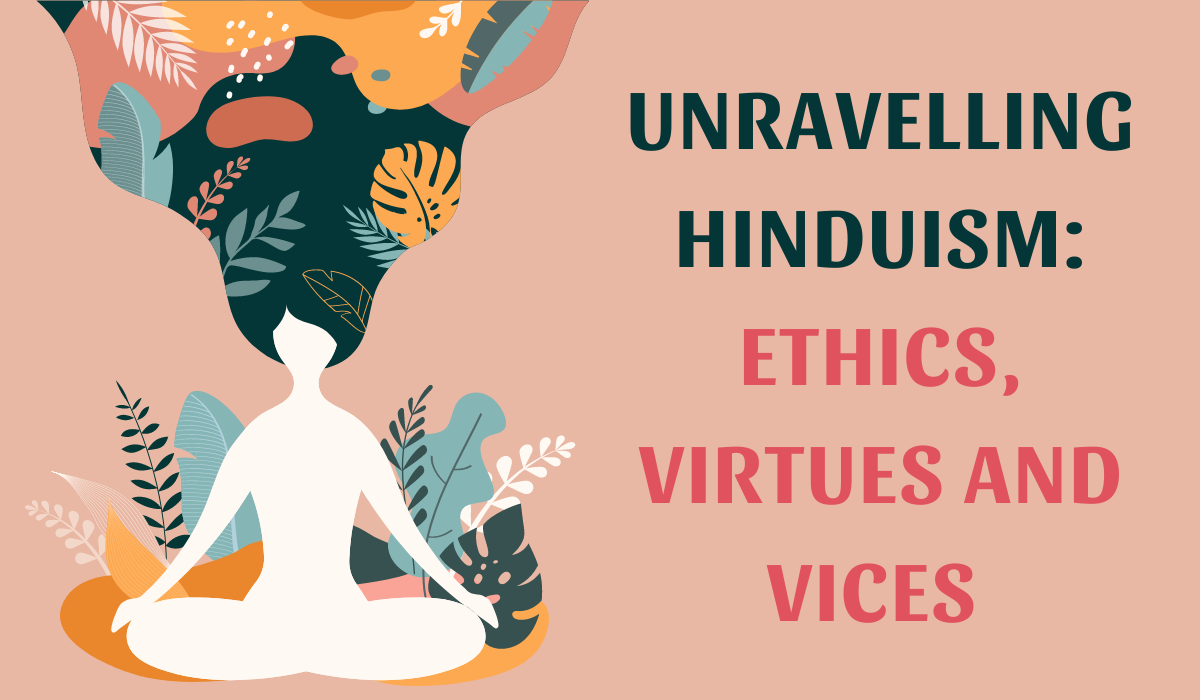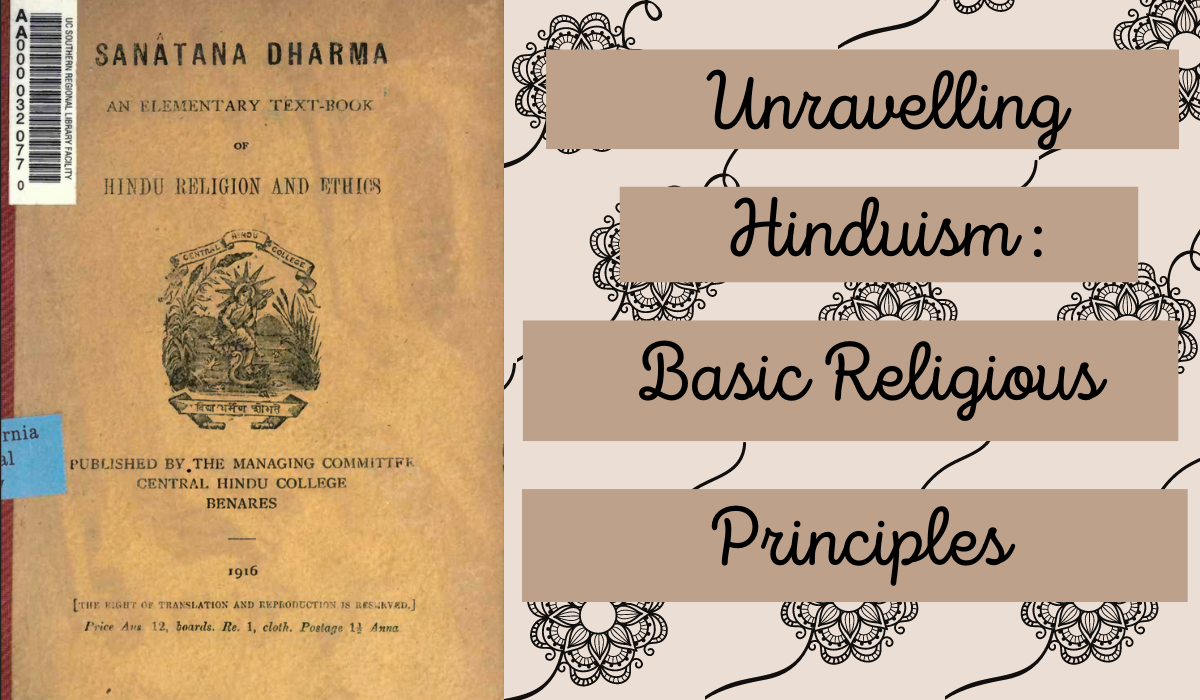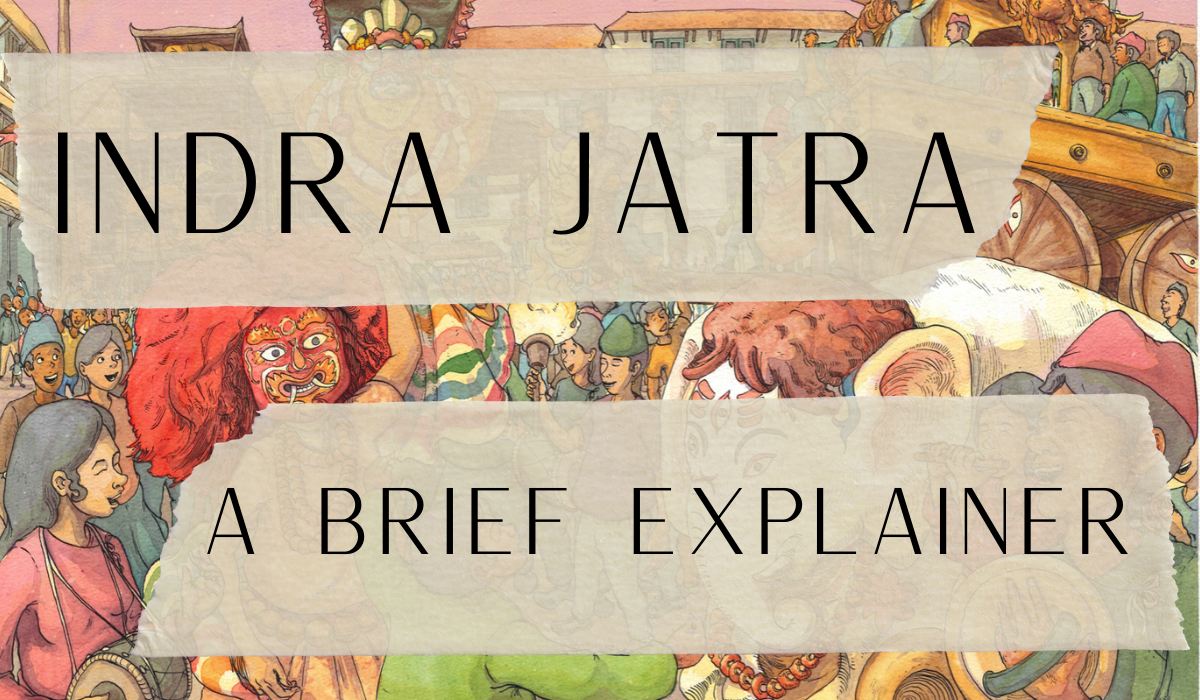Unravelling Hinduism: Ethics, Virtues and Vices

I read “Sanatana Dharma: An Elementary Textbook of Hindu Religion and Ethics” so you don’t have to.
I am sure that some of us have both the time and intellect to delve into and understand the Hindu scriptures. However for most of us (myself included) this is probably more than we can handle. Therefore I found the aforementioned book (Sanatana Dharma) and read it to gain a better understanding of my religion and the rituals and practices which define life in Nepal for a lot of people. Even this textbook version of Hinduism was a challenge to understand and process, though I have tried my best to root out the key takeaways and major points of importance and plan to share them with you all.
Therefore, I will attempt to break the vast and confusing Hindu teachings down into smaller more accessible “bite sized” chunks. What follows is a simplified explanation of Hindu ethics, desirable virtues, detestable vices and how we determine what is right and what is wrong.
You may find it helpful to read the first two parts of this series before reading the following in order to clarify terminology and underlying principles which are referred to here.
Read Unravelling Hinduism: Basic Religious Principles and Unravelling Hinduism: Rites, Routines and Rituals.
Ethics , also known as morality, is what helps us decide what is right. Ethical science is what determines right and wrong in Hinduism. It is defined as a definite and systematically arranged series of facts of conduct related to each other which underlie distinct principles. Ethics or morality is about making sure of the welfare of all beings. This is achieved by showing people how to live in harmony with their surroundings according to the proper science of conduct. We are reminded that what is right is not always pleasant but doing what is right will lead to greater everlasting happiness and an eventual union with Ishvara (god).
The foundations of ethics as described by Hinduism are as follows. Hinduism teaches us that “The Self is One” given that all selves are a reflection of the One Self (Ishvara) seeing as the same life-force fills everyone. Therefore The One Self is contained within every Jiva (spirit or soul). This is the primary fact that lays the foundation for religious ethics in the world there are innumerable Upadhis (bodies and minds) which relate to one another. There can never be completely “right” relations between them until each and every one recognises that they are all One. This leads to the teaching that if something helps everyone, this is the only thing that really helps each individual and if we hurt someone else we are really only hurting ourselves.
The Pravritti Marga is the path of going forward that each Jiva follows when building up into a separate individual with a strong intellect and identity. It consists of many forms which grow and develop, evolving into separate individuals and growing from one’s experiences. To my mind this refers to the journey that each Jiva goes on when evolving through different forms of being (as referred to in the first part of this series). A Jiva must go through this to learn that it is part of a much greater self and that our strengths can only bring happiness if used for the benefit of the greater self. This leads to the Nivritti Marga, the path of return, in which the Jiva learns to give to all that are weaker than himself and share what he has with those who need it. These two paths together make up the process of evolution, which is what Ishvara wills for us all. When we work with his will we are right, and we work against it we are wrong. Hence, we must work to promote unity and reduce separateness as this is the will of Ishvara and therefore right.
For less developed Jivas, separateness can be an aim too, though this is because they are on their own path of evolution and our morality at any given time is related to where we are on this path. To ensure the proper evolution of our Jiva, we were given the Ashramas (stages of life) and Varnas (stages of development a Jiva goes through) to show us what kinds of virtues we should aim for at any given stage of our lives. Additionally, since we cannot all find out the will of Ishvara we were given the Shastras (sacred books) to help us distinguish between right and wrong.
Since the ultimate aim of each Jiva should be union with the One Self, we can determine whether an action is right based on whether it promotes union and harmony or separateness.
Qualities possessed by those who promote union and harmony are: mildness, modesty, forgiveness, fortitude, purity and an absence of envy, pride and fickleness. Those who promote divisions are characterised by: hypocrisy, arrange, conceit, wrath, harshness and a lack of wisdom, which describes someone who is full of ahamkara (egoism and selfishness)
An important factor in ensuring unity is mutual service or sacrifice, in addition to which we are taught that we must do what is right in repaying our debts. Hinduism teaches that we each owe the same fundamental debts to the world, which must be repaid appropriately. These are as follows:
- Debt to Rishis (teachers) which is paid through the Brahmacharya Ashrama which is the stage of life in which one must study and learn.
- Debt to Pitris (ancestors) which is paid through the Garhasthya Ashrama which is the stage of life in which a family is reared and charity is performed.
- Debt to the Devas (deities) which is paid through the Vanaprastha Ashrama which comprises sacrifice and meditation.
By paying these debts we are doing our duty or that which we ought to do. Doing one’s duty is considered to be a virtue, while not doing one’s duty if considered a vice. The virtuous fulfil all their duties while the vicious do not.
Virtues are also known as forms of truth which are seen in the Laws of Nature. The most important of these is unity in the face of diversity. Diversity here means a lack of unity with the inner self and Ishvara. In this vein, we must always tell the truth and treat others as we wish to be treated as treating them differently suggests that we see them as separate from us (which is not in the spirit of unity and would mean that more vices arise). Being truthful is therefore the most important Hindu commandment even if being truthful results in a loss. Many examples of the sanctity of truth can be seen in Hindu literature, most notably in the Mahabharata in which characters value the integrity of their word over their kingdoms, victories and loved ones.
Moreover, Ishvara is composed of Thought, Power and Bliss, and as reflections of him, our Jivas are also made of these characteristics. Bliss is always in search of satisfaction and looking to unite the Jiva with sources of pleasure. Sometimes the things we encounter in this search are attractive to us, and sometimes they are repulsive. Gradually the Jiva directs its emotions towards what is right, guided by reason and the will of Ishvara, and develops these into virtues. This shows us how our emotions inform our ethics. The more positive emotions such as love we cultivate, the more bliss we have which leads us to attract more people and beings towards us, which leads us closer to union with Ishvara. Therefore what makes us happy is also what is right as it leads us closer to god. This means that unhappiness arises when we go against what makes us happy and against unity.
The Jiva is not just related to all those around it but also to its own koshas (bodies) and the Jiva must live in harmony with the koshas. As the Jiva grows it learns the virtue of self control which gives the higher Self control of the lower selves. Someone who has mastered self control is much better at creating harmonious relations with others. Self control over our actions is backed up by three forces: mind, speech and body. The mind is the Mankomayakosha and includes our emotions. The mind must be freed from desire and made into the master of our senses. This is the most important step in achieving self control. Speech can be controlled through thinking before we speak, and the body can be controlled through creating good habits when we are young. Our bodies must never be a source of harm towards others as this harm will eventually result in others feeling hatred and malice towards us. By controlling our mind, speech and body we can become righteous as we have created “right” relations with our surroundings.
Virtues and vices appear in our relations with other human beings as well; in our interactions with others we should keep in mind the significance of love and hate. If we show love to others this helps produce love within them, and when we show hate to others, hate awakens in them. Love encourages us to make sacrifices for the good of others and so love is the root of all virtues and unity. Virtues, which stem from love, are shown through reverence, devotion, worship, submission, loyalty, hospitality, forgiveness, courteousness, compassion and protection. Conversely hate encourages us to take away from others making it the root of vices and separateness.
Therefore, in order to combat hatefulness we must remember to answer hate with love. For example, if someone speaks angrily to us we should make an effort to reply in a gentle manner rather than reply angrily which would be much easier. Evil, or vice, answered with evil simply goes on to create more evil in the world. If we answer injustice and unkindness with sweetness and agreeableness we can win over the one who treats us badly rather than creating more hatred. Once you are used to doing this, the anger of others will no longer cause you any anger and all your energies can be directed toward turning the harsh feeling of the other into something kind and positive.


